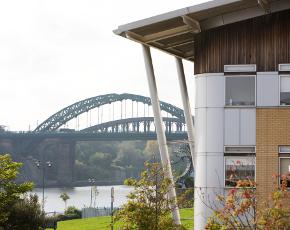Tom Baker, head of ICT at Sunderland City Council, has an office in the council's datacentre.
It is not a bad place to have an office because the datacentre has been somewhat rejuvenated, thanks in part to modern IT that takes up far less space than the old mainframes that used to be housed there.

The modernisation has made Sunderland City Council's datacentre something of a profit centre, and strategic to the council's goals of digital equality and community ICT.
With a background in commercial IT, having previously worked at infrastructure and business services group Mouchel, Baker now runs a city council datacentre that provides hosting for third parties, virtual desktops for the council, and a suite of cloud services for community ICT.
The council has spent the past two years building its cloud computing infrastructure with IBM. "It is very rare to find a local authority building its own cloud computing platform, but the council is very mindful of some of the challenges it faces given the financial backdrop," he says.
The city has a long heritage of creating and fostering social and cooperative enterprise, and Baker says Sunderland City Council is looking to take this forward, not only by continuing to support these initiatives, but also by enabling organisations to get more ingrained in public service delivery.
"We will use the cloud computing platform to provide low-cost, scalable, pay-per-use computing facilities to organisations we might be doing business with," he says.
The tools IT has provided can give the council the confidence that the organisations using the Sunderland City Cloud are operating in a safe and secure manner when dealing with public data, he adds.
IT modernisation that pays for itself
The datacentre used to house the council's mainframes, but IT modernisation has seen the space required by the council's IT shrink, allowing Sunderland City Council to run its own cloud infrastructure, as well as act as a hosting provider.
"It has become very much like a business," says Baker. "We are making a decent return on this building. We can effectively sell the space. It becomes an asset of the city."
In a tour of the datacentre, he points to a server and says: "We are getting rid of that AS/400, replacing it with some modern servers, and that will create some more space." The AS/400 is running legacy council applications, which are being migrated onto a Microsoft Dynamics platform.
Sunderland City Council's datacentre hosts school systems for Sunderland and the North East, racks for other councils, a node for the NHS Local Involvement Networks (LINks), a rack for a Primary Healthcare Trust, as well as servers for Fire and Rescue.
"All of the gas infrastructure for the North East is run out of this datacentre, as well as a Vodafone point of presence, and we host racks for Virgin Media," says Baker.
The council is providing tools that enable organisations within the community to get involved in public services. These organisations may not have access to the systems and budgets needed to provide such services. The Sunderland City Council cloud is critical to support this without them having to understand how to work with the Information Commissioner or protect personal data, he says.
"The council has found itself delivering a cloud-based service to provide something which is open, flexible and scalable, that other people can tap into through our identity management solution, so they can deliver public services in the same way as the council and are able to access our data securely."
Datacentre infrastructure
The private cloud in Sunderland City Council's datacentre uses a 10Gbps network backbone, IBM XIV storage and IBM x3850 quad-processor servers, which are fully virtualised using VMware to run the council's applications. The servers also run Citrix XenDesktop Platinum, NetScaler MPX and XenServer, to provide virtual desktops within the council. The cloud platform uses a Cisco network.
"The beauty of the configuration is that it is high performance. Things are much quicker. Users access file stores two racks down," he says.
Data is replicated to another IBM XIV storage box 10 miles away.
The servers are monitored and managed using Tivoli. The council uses Tivoli Service Automation Manager to control cloud provisioning. "We have a portal where I can provision a server within three minutes from my desk," says Baker.
Working with Citrix partner Cetus, Sunderland's virtual desktop infrastructure (VDI) has been configured to provide third-party Active Directory support, which Baker says will enable the council to provide virtual desktops to third parties.
"Citrix has been very good in terms of licensing models, so we can essentially leverage our spending power for the benefit of the city," he says.
In his office, Baker uses a Wyse terminal to connect to the datacentre and access his Windows desktop.
Commenting on the virtues of desktop virtualisation, he says: "I can migrate the workload from my desktop terminal to my Blackberry and vice-versa. It provides a huge amount of flexibility and the terminal uses far less power on the desktop. If it fails, I can use another device to access my corporate applications."





